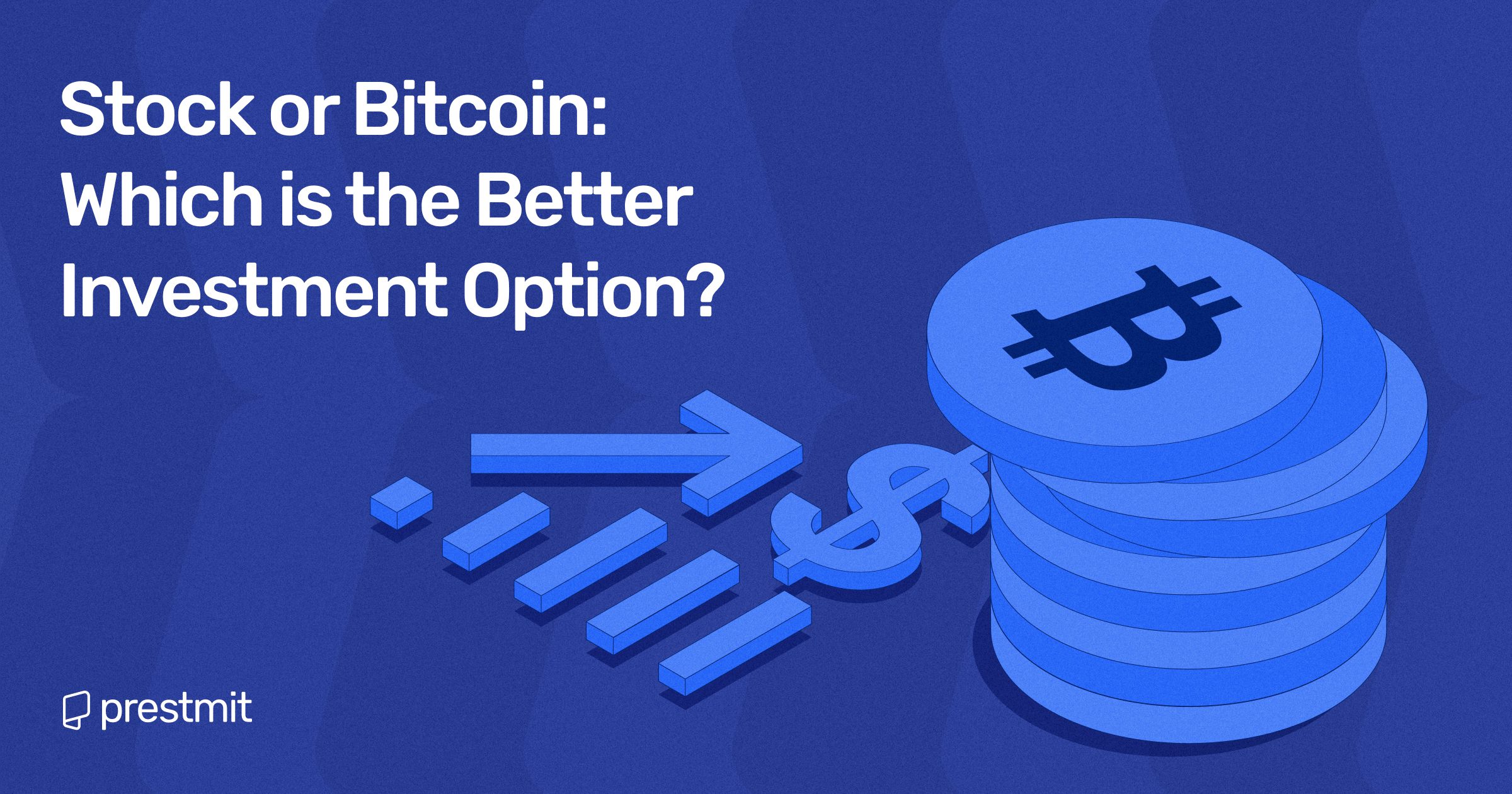Table of Contents
Investiment has always been one of the best ways to grow wealth and secure a financial future. In the past, stocks used to be the primary option for investors, but with the rise of cryptocurrencies, many investors have now diversified their portfolio but the question remains whether investing in Bitcoin is better than investing in stocks.
Buying shares of companies like Apple, Coca-Cola, or Microsoft is a stable way to build long term wealth. Stocks represent ownership in a company and can pay dividends or rise in value as the business grows. On the other hand, Bitcoin is a completely different kind of investment. It’s not tied to any company or government. Instead, it’s a digital asset powered by blockchain technology and known for its massive price swings.
So which one is the better investment option between the two? In this article, we’ll take a look at what stocks and Bitcoin are, their differences, factors you should consider before choosing between the two, etc.
Note: The statements in this article do not intend investment advice or any advice on financial products or digital assets. They are to provide general information and nothing more.
What Are Stocks?

Stocks (also called shares or equities) are units of ownership in a company. When you buy a company’s stock, you own a small part of that company. For example, if you buy shares of Apple, you become a partial owner of Apple Inc. If the company performs well and earns profits, the value of your shares can rise. Some companies also pay dividends which is a portion of their profits distributed to shareholders.
Investors usually buy and sell stocks through stock exchanges like Nigerian Stock Exchange (NSE), New York Stock Exchange (NYSE), Nasdaq, London Stock Exchange (LSE), etc. The stock market has been in existence for centuries and remains one of the most trusted ways to build long-term wealth. Investors usually make money from stock through capital gains and dividends.
An Overview Of Bitcoin

Bitcoin is a digital currency (cryptocurrency) created in 2009 by an unknown person or group under the name Satoshi Nakamoto. Unlike traditional money, Bitcoin isn’t issued or controlled by any government or central bank. Instead, it operates on a decentralized blockchain, which is a public digital ledger that records every transaction.
Unlike stocks, Bitcoin doesn’t pay dividends or represent ownership in a company. Its value comes from supply and demand and the belief that it will remain valuable over time due to its limited supply. Bitcoin’s allows people to send and receive value online, directly and securely, without needing banks or intermediaries. But beyond being a currency, it has become a popular investment asset and it’s sometimes referred to as “digital gold” as its value is generating conversations on hitting $1 million.
Therefore, the staggering value of Bitcoin has been of interest to individuals and institutional investors who want to leverage the potential of the crypto asset for maximum gains. This is with the understanding that crypto trading is one of the best ways to make money online in this digital age.
What Are the Key Differences Between Stock and Bitcoin?
1. Price Volatility
Volatility is the extent to which the price of an asset fluctuates over time. So, highly volatile assets can experience significant price swings (upward and downward), while less volatile assets are likely to show some price stability.
In essence, the uncertainty about the future value of cryptocurrencies, although they have been touted as the future of money and physical assets, does not usually back them, making them more volatile than stocks.
Additionally, the influence of Bitcoin Whales, individuals, or companies who hold a large amount of BTC can impact Bitcoin price. Thus making the asset vulnerable to volatility. But we should also not rule out the fact that stocks can experience unprecedented periods of volatility.
2. Regulation
Most stock markets across the world are subject to government oversight. Regulatory bodies like the Securities and Exchange Commission (SEC) have the authority to investigate and punish any wrongdoing that contravenes the existing securities and financial laws in the country. This protects investors and reinforces market confidence to invest in stocks.
Meanwhile, Bitcoin is a product of a decentralized system where the meddlesome of third parties like governments and banks has been eliminated. This has made the crypto market largely unregulated. But, various governments and authorities of different countries or regions are already developing regulatory frameworks to bring crypto activities under the ambit of relevant authorities’ oversight.
3. Scams And Security Risks
The crypto market has become a hotbed for scams of all sorts. This is owed to the largely unregulated nature of the market, which has encouraged malicious entities to steal from unsuspecting users through devious means.
From phishing attacks to pig butchering (romance scams) and even crypto Ponzi schemes – these have resulted in huge losses for victims who fell them.
For instance, the OneCoin scam perpetrated by Ruja Ignatova was one of the biggest Bitcoin Ponzi schemes and is even considered one of the biggest crypto scams ever. This fraud ripped people off about $5.8 billion by marketing OneCoin as an altcoin to become “Bitcoin Killer.”
On the other hand, stocks are also not immune from scams and security risks. Pump and dump is one of the popular stock scams whereby highly exaggerated statements make a stock’s price increase artificially in a bid to convince investors to buy. After this, the perpetrators of the scheme will sell their holdings at a much higher price.
This is not an isolated case, as there are other stock scams you should know. Perhaps you can recall Bernie Madoff, whose Ponzi scheme stole about $50 billion in the early 2000s.
4. Diversification
You can diversify your investment into different companies across the world to own a stock. You can be a shareholder in a tech company while holding stock in a real estate firm. This prevents you from putting all your eggs in one basket while maximizing your returns on investment (ROI).
Meanwhile, there is no such opportunity in Bitcoin investment, as this asset class influences the crypto market. So, diversifying your crypto portfolio may be less effective than with stocks.
Frequently Asked Questions (FAQs) About Stock Or Bitcoin
Should I Invest In Stock Or Bitcoin?
It can not be established that one is better than the other between stock and Bitcoin. This depends on your risk tolerance, as every investment has its risk. You might consider investing in the two, as diversifying into stock and Bitcoin can open the door for lucrative returns.
How Much Should I Invest into Crypto Or Stocks?
There is no rule of thumb for how much you can invest in Bitcoin. But, it is encouraged to invest 1% or 2% if you are a beginner investor. It is also crucial to not invest more than 10% of your portfolio in individual stocks.
Which Is Safer Between Stocks And Bitcoin?
Let’s reiterate that all investments have their risk(s). But, the knowledge to mitigate the risks can help you to make good returns over time. So you may need to consult with professionals in the various markets to guide better.
Conclusion
We can not overemphasize how important investments can be to drive wealth and maintain financial health. Asset classes like stocks, bonds, cryptocurrencies, commodities, etc., are available for investors to explore for possible maximum gains.
However, it is important to research and consult with experts to better understand the benefits and pitfalls of such an investment journey.
Last updated on October 27, 2025

